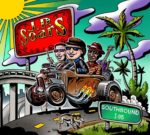 I-95; almost two thousand miles from Maine to Florida, if you’re Southbound like J.P. Soars. Not as well known as Route 66, but here’s a coincidence; I’m reading a guitar player’s memoir at the moment (next review up) which references I-95 extensively. And Southbound? Well that’s heading towards Florida and who wouldn’t, particularly in the winter? The title song’s a road song, plain and simple, in the age-old tradition; it’s the story of touring musicians, road dogs, and it’s the most straight-up, no-nonsense song on the album. No matter how sophisticated your tastes and influences get, it’s always fun to throw in a few loud riffs and fills
I-95; almost two thousand miles from Maine to Florida, if you’re Southbound like J.P. Soars. Not as well known as Route 66, but here’s a coincidence; I’m reading a guitar player’s memoir at the moment (next review up) which references I-95 extensively. And Southbound? Well that’s heading towards Florida and who wouldn’t, particularly in the winter? The title song’s a road song, plain and simple, in the age-old tradition; it’s the story of touring musicians, road dogs, and it’s the most straight-up, no-nonsense song on the album. No matter how sophisticated your tastes and influences get, it’s always fun to throw in a few loud riffs and fills
J.P. Soars is no average blues player. Great players don’t allow themselves to be defined by one genre; blues/rock might be at the centre of “Southbound I-95” but it doesn’t define it. And before we move on, there are fifteen songs on the album, but the funky “Sure as Hell Ain’t Foolin’ Me” crops up in ‘explicit’ and ‘clean’ versions (‘bullshit’ becomes ‘BS’) and “Arkansas Porch Party” reappears as the muted background for a hidden track.
If you’re this good, you don’t just keep recycling the same old licks; you keep moving on and soaking up more and more esoteric influences which then resurface in your work. You might do the Albert King and Muddy Waters covers (and J.P. does “When You Walk Out that Door” “Deep Down in Florida” with style and conviction) but there’s a lot more to it than that. Some of the stylings are fairly standard; “Southbound I-95” opens with a surf-punk guitar sound (think Dick Dale meets Link Wray, “Shining Through the Dark” is sixties pop-soul with a hint of “Hey Baby” while “The Grass Ain’t Always Greener” channels “Great Balls of Fire” and the Gary Bonds stomper “New Orleans”.
Things get a bit more esoteric with the mariachi horns adorning “Deep Down in Florida”, the surf meets Perez Prado sound of “Across the Desert” and the strangeness that is “Troubled Waters” which opens like Lynyrd Skynyrd before morphing into an Eastern-influenced instrumental breakdown with a banjo taking the sitar part and back into Southern rock again.
In a world where the hopes of megastardom as a blues/rock player are minimal (apparently there’s only room for one Joe Bonamassa at any given time) and you have talent to burn like J.P Soars, then you just have to follow your vision and go where it leads you. On the whole, this is a hugely entertaining album; it sounds like everyone’s having a great time and the playing is phenomenal – give it a listen.
Release date Friday March 8th .
And enjoy this:
 What a wonderful thing it is to be able to go, ‘yeah, I’ll have a bit of that’ when you’re in your local having a pint. So happens the promoter of the local folk club was in. So happens he’s a long-time mate of Steve Gibbons. Turns out he’s persuaded him to play an unplugged solo gig upstairs at the intimate but absolutely luverly (if we overlook the early-closing bar) Rainbow Room at the Foxlowe Centre in my current and I suspect final hometown of Leek.
What a wonderful thing it is to be able to go, ‘yeah, I’ll have a bit of that’ when you’re in your local having a pint. So happens the promoter of the local folk club was in. So happens he’s a long-time mate of Steve Gibbons. Turns out he’s persuaded him to play an unplugged solo gig upstairs at the intimate but absolutely luverly (if we overlook the early-closing bar) Rainbow Room at the Foxlowe Centre in my current and I suspect final hometown of Leek.
I haven’t seen him in 42 years, ever since I did the support rock ‘n’ roll themed disco and compere duties on a gig whilst he was touring Scotland just as his cover of Chuck Berry’s “Tulane” was in the top forty, having briefly made it into the top ten.
So, yeah, I will have a bit of that, thank you very much.
Said promoter, Dave Rhead, is also opening for SG tonight. This is brave of him as he has just fallen base over apex, stone cold sober and in full public view, over a local pavement. He’s well banged up and does well to hobble through “Leaving on a Jet Plane” and Anthony Toner’s lovely “Always Meeting my Cousins at Funerals”. To add insult to injury he managed this just outside Specsavers. Maybe he should….
When I last saw the Steve Gibbons Band they were absolutely in their pomp, top of their game. Huge great P.A. system, all the paraphernalia of a band signed to a major record company with a hit single and album in “Rollin’ On”. And he’s just finished a tour of parts of Scandinavia with a full band, so his trip to Leek for this solo low-key ‘unplugged’ set was clearly going to be something of a ‘gear change’ for him.
But he’s a trouper, is Steve Gibbons. His Dylan Project has kept playing gigs, he still packs them in on full band gigs, has played a number of big festivals in recent years, as well as solo and unplugged events like these. He is, to quote Pete Townshend, ‘road-worn’ but he cuts an elegant and dignified figure as he sets up to go.
First song is one of his early ones from the sixties. He was around in The Uglys and The Idle Race and the Dominettes before that – and the Dominettes can trace lineage back to 1960. This guy has been at it All Day. As far as I can discover, this is his first song recorded for a major label – “Wake up my Mind” was out on Pye back in 1965. Didn’t do much over here but went top twenty in Australia. They all count.
He then heads off into “The Chain” from “Maintaining Radio Silence” and “Wild Flowers” where the Dylanesque phrasing comes through and a lovely love song for Valentine’s Day, “Still in the Dark”. Can’t Get Next To You, Babe. The mystery of relationships and all that malarkey. “Graffiti Man” was an amusing aside from his observations of Birmingham life, and “Down in the Bunker” was a song that indeed took me back.
“I Got Chuck In My Car” finished off the first half of the set with more than a little nod to Jerry Reed’s “Tupelo Mississippi Flash”, a former hit single of his (apart from the fact that it’s a song about Elvis). More about that one, though, later.
Time to reflect.
The Steve Gibbons Band hit serious paydirt for probably the first time in the period 1976-1979; and he was by no means a young man by then. He was the right man at the right time, in many respects; rock ‘n’ roll and rockabilly were enjoying a resurgence, even amongst home-grown acts, and his energetic and fleet-footed reworking of Chuck Berry’s “Tulane” sort of bridged the gap between rock ‘n’ roll revisited, punk energy levels and pace and the (by then) rapidly fading pub rock scene. Also; it kind of fitted the zeitgeist. The Fonz. Grease was just about to hit VERY big. “American Graffiti”. Showaddywaddy selling truckloads, and here comes Shakin’ Stevens…..you get the picture.
But he was a whole lot more than that. In the second half of the show he began mining the rock ‘n’ roll roots as only someone who had been playing music and listening to all that amazing stuff first time around can. I honestly believe you don’t HAVE to be American to understand how great rock ‘n’ roll works (but it helps) but if you’re not, what helps a very great deal is if you were ‘around’ when these great, great songs were new to the world. And for that you really don’t need to be born in the fifties, like me; you need to be born in the forties, like Steve Gibbons. And through most of the second half of the set, he showed us how true that is. Starting with “Hey Buddy” dedicated to Buddy Holly, “Memphis Flash” (please see above!) dedicated to Elvis including a sneaky peek at “That’s Alright”, the drug mule song “Mr Jones” the roots of American rock ‘n’ roll music are laid bare by the dry, dust-bowl voice and the simple but authentic guitar chops.
The problem is – if you were born in the forties, you’re knocking on a bit now, and whereas age might have done really interesting things with his voice, he freely admits it hasn’t done him any favours in the memory department, so there are occasional meanderings and excursions, sometimes between songs, sometimes during a song, but on the rare occasions this happens he manages to scrape it all back together again and keep moving. Be under no illusions; his performance wasn’t perfect – as you might expect from someone carrying very many years on his back. But what he brought to the party meant you were absolutely forced to overlook that and to do otherwise would just be plain churlish.
This guy was more ‘Americana’ than many who currently wave that particular flag decades before anyone so much as mentioned the word. A point which is subtly underlined when he swoops into Dylan’s “Like A Rolling Stone”, Bo Diddleyfies “No Spitting on the Bus” (which might sound like Americana but is about as English in content as a pint of mild) and “Man in the Long Black Coat”.
Bizarrely, events are interrupted by the drawing of a raffle, before he draws the evening to a conclusion with a moving rendition of Rick Nelson’s “Hello Mary Lou” before being called back for an encore during which he wanders amiably through Chuck Berry’s “Memphis Tennessee”. Somewhere I imagine Dave Berry has neglected to start his gig with “Memphis Tennessee” but has decided to sing “Tulane” instead. The universe must be kept in harmony.
Yes.
Speaking with him afterwards was an absolute delight. He signed my 45s and indeed the page of our book where the Steve Gibbons Band gets a mention so I’m well chuffed. So the guy who toured America with The Who, and has shared stages with the likes of Lynryd Skynryd, ELO and Little Feat quietly packed his personal kit away, no doubt already contemplating the next stop on the seemingly endless road in whatever incarnation presents itself to him. Because that’s the deal.
Steve Gibbons is one of Britain’s last real troubadours who link directly back to the dawn of rock ‘n’ roll in the UK – had hits during (arguably) its most turbulent and explosive times – and yet whose voice and presence recall a world and a culture many miles removed.
If that moves your soul, catch him while you can. If not, well, your loss.
 Well, what do we have here? An ‘intimate’ venue just off the main city centre which may not be big but it is clever. Great, wide stage, fabulous sight lines, fairly shallow standing-only area, nice uncluttered bar with efficient staff and fair prices away to the side but in the same room.
Well, what do we have here? An ‘intimate’ venue just off the main city centre which may not be big but it is clever. Great, wide stage, fabulous sight lines, fairly shallow standing-only area, nice uncluttered bar with efficient staff and fair prices away to the side but in the same room.
Perfick.
You come to see a band here – and they are In Your Face; so it really lends itself to ‘you’re having it’-type performances.
Which is what we get from The Skids from the get-go. Support band Borrowed Time are well-chosen for the task and get the crowd seriously warmed, especially with their song “Borrowed Time” which I suspect struck a chord with quite a few in the room.
But, The Skids.
Oh My Goodness.
On they come – and on guitar, Big Country main man Bruce Watson. I had seriously not done my homework on The Skids – I figure sometimes it is best just to go out, grab a beer, and see what you get. One of the great pleasures of doing this gig, for me, is not being over-prepared and therefore, everything comes as a surprise. And for me, this was a gig full of pleasant surprises – and because I hadn’t done my homework I wasn’t expecting that because This Lad Can Play A Bit. Last time I saw him, he and the Big Countryfolk were being supported by The Osmonds on the night when the toothsome pair for some reason neglected to go ‘whinny, whinny’ during “Crazy Horses”.
But I digress.
Richard Jobson is, first of all, in great nick. Whilst no longer in the first flush of youth, he still has great bundles of energy and seems to have taken care of himself down the years. Self-deprecating to a fault, though; rips it out of himself for terrible dancing – and then hurls himself about the stage all gig long, just as he did ‘back in the day’ as a sort of cross between a Northern Soul floor cruiser and a demented Highland flinger – and he’s a big lad to be doing that kind of thing. And the voice; if anything, this guy sings better now than he did then – and his voice is a quite fabulous vehicle for the anthem-rich body of work which is The Skids songbook.
And we get them all tonight and more besides.
“Animation” kicks off and it is so full of hooks even if you hadn’t heard it before you’d still find yourself attempting to sing the lyrics. Followed in breathless short order by “Of One Skin”, which came into my life one day via a demo 4 track EP entitled “Wide Open” and is a real stunner; you didn’t get many ‘punk’ songs back then which had changes of pace, complete ‘breakdown’ sections etc, etc and STILL a killer hook. And straight into “Charade”, another hit tune which got them loads of Radio 1 plays and folks like me up and down the country playing it whenever the opportunity presented itself. You just couldn’t not play it. The hooks get in, you can’t get ‘em out. It’s an earworm at a time when there were plenty of bands with ‘attitude’, and some who could actually play, but not many who could write a live anthem that was a turntable hit as well and not have some people accusing them of ‘selling out’. Now that is a clever trick – and to perform it 40 years on or so with so much venom and bite is nothing short of exceptional.
From “Burning Cities”, their latest on No Bad Records “Kings Of The New World Order”, and “One Last Chance” slotted well into the set, definitely sounded like ‘Skids songs’, and didn’t let up on the momentum one bit. Quite a few ‘heritage’ bands could learn from Jobson and Co about the fine art of introducing new songs into a set. Many musicians of a certain age publically bemoan the unwillingness of live audiences to ‘accept’ new songs in a set which is largely nostalgic – but The Skids proved it can be done, it can be done in such a way that the new tunes can be used to add interest to a set and engage the audience even more – so let’s have no more of that negative talk, eh? The new ones went down well here tonight in Derby and they deserved to do so.
Then a stunningly-performed triple; the breakout track, “The Saints Are Coming” – and after this you could be forgiven for looking to the skies to see if indeed they were – the amazingly prescient “Working For The Yankee Dollar” – a sort of “Not Born In The USA” for us careworn non-Americans who grew up still paying off the lend-lease bill; and “Hurry On Boys” – singalongajobbers in turbodrive on this one.
A couple from “The Absolute Game”, “Woman In Winter” and “Circus Games” were served with the awesome top 20 hit “Masquerade” as a chaser. Once again I fail to see how anyone cannot fall under the spell of this thunderous track, played, once again, with strident freshness and verve. Word here for the rhythm section. You didn’t know they were there. In a good way. Not a foot wrong all night.
And the ground rumbled (OK so I just noticed the rhythm section) and Mr Jobson declares, ‘well, it’s now or never…’ and doesn’t, surprisingly, launch into what would have been a highly incongruous version of the Elvis Presley classic, but the Greatest Hit, “Into The Valley”. Lyrics are so obtuse you can’t really sing along to this one but hey, it doesn’t stop you trying. La la la la la, la la la la la. Rock classic? Yep. Should it be on more ‘drivetime classic’ CD compilations and playlists. All Day Long, my friend. Sometimes the ‘labels’ we put on things don’t help and don’t work. Sometimes our compartmentalizing of stuff leads to miscarriages of justice. This should have been a number 1 hit.
I did my bit. Virgin had stopped sending me free stuff by that time. So I bought a copy. If you were ‘around’ then – and didn’t – I blame you, personally, for the fact that this didn’t happen.
“Happy To Be With You” and “TV Stars” bring the contractual part of the proceedings to an end and rather than head off to the back of the building for no apparent reason just to traipse back on again, the band elected to stay put and deliver a rousing encore without the need for a breather; and, seemingly just for the hell of it, the band run with my ‘Elvis’ idea and produce a killer version of the Pistols’ “Pretty Vacant” and The Buzzcocks’ “What Do I Get?” before finishing with “The Olympian” and a spirited reprise of “Of One Skin”.
The two-guitar attack of Bruce and Jamie Watson combined with the rock-solid rhythm section and the strident vocals of Richard Jobson are an incredibly strong proposition. If you haven’t been to see these guys in a long while, then you should. They are the Real Deal and can and do deliver the goods as they should be delivered.
Backstage after the gig and briefly reminiscing with Mr Jobson about a gig they did in Dundee where I was compere and DJ guy back in ‘78, I suggested to him the band really should be playing far bigger venues than this. He smiled wryly at that; the band have played many large festival gigs in this incarnation but it is quite clear they feel happier – much happier – when playing indoors, to be playing the kind of gig where the crowd are right there, right down the front and totally free to leap all over each other, throw beer all over each other and enjoy the sheer joy in this stuff.
And long may they continue to do so.
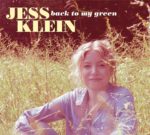 It’s a phrase that first was first heard in feminist politics in the late sixties – “The personal is political” – and it’s just as applicable in the USA today. Jess Klein’s latest album, “Back to My Green” is the culmination of a period of turmoil that was both political and personal; a new relationship (and marriage) and a certain presidential election in 2016. Both of those things had a massive impact on Jess Klein’s work, and her upheaval is definitely our gain, pushing her out of her comfort zone and into new ways of writing and recording. A stripped-back, raw set of songs morphed over time into a band sound which even stretched to a couple of sixties-style string quartet arrangements.
It’s a phrase that first was first heard in feminist politics in the late sixties – “The personal is political” – and it’s just as applicable in the USA today. Jess Klein’s latest album, “Back to My Green” is the culmination of a period of turmoil that was both political and personal; a new relationship (and marriage) and a certain presidential election in 2016. Both of those things had a massive impact on Jess Klein’s work, and her upheaval is definitely our gain, pushing her out of her comfort zone and into new ways of writing and recording. A stripped-back, raw set of songs morphed over time into a band sound which even stretched to a couple of sixties-style string quartet arrangements.
The album’s rough trajectory is from the personal through the personal/political and back to the more contemplative personal as the album closes and, although the title track has a powerful message, the personal and political strands are knitted together inextricably in the album’s longest and hardest-hitting song “New Thanksgiving Feast” which ties highly personal childhood reminiscences to ancient fishing rights, Native American pipeline protests and the ‘taking the knee’ national anthem protests spreading through American sport. It’s a heady mix and underlines a theme that’s increasingly common in Americana today; depending on whose figures you believe, ninety-nine per cent of Americans are descended from immigrants. Jess Klein only has go back two generations to find that link (a bit like POTUS really, but I bet Jess’s father didn’t attract the ire of Woody Guthrie). “Blair Mountain” also combines the two strands, looking at the impact of rapacious mining on the economics and ecology of a small town while “Gates of Hell” rails at the lunacy of life in the land of the free in the early twenty-first century.
Which brings us to the title song, positioned in the middle of the album. The message is that there can be an escape from the madness if you find the right place. I’ve focussed on the lyrical content, but Jess has also created some memorable melodies and the band creates musical settings that allow each of the songs to shine. The album is studded with interwoven personal insights and social comment married to great tunes. I’ll take that any day of the week.
“Back to My Green” is released in the UK on Friday February 22 on Blue Rose Records (BLU DP0727) and Jess is touring the UK in April-May 2019.
 Ok, a couple of little stories for ya from Shepherd’s Bush Empire. First one’s from 2010.
Ok, a couple of little stories for ya from Shepherd’s Bush Empire. First one’s from 2010.
Backstage at a Jukes soundcheck, I was loitering waiting for Southside Johnny to arrive for an interview and trying pretty unsuccessfully to pretend I wasn’t nervous. I mean why would I be, this guy had only been a hero of mine for over thirty years and this was my first interview with him. Think about something else, listen to what’s happening down on the stage at the end of the soundcheck. So I did and it was unusual; it was Jeff Kazee singing something I had never heard at a Jukes show. Jeff had missed the European mainland leg of the tour because of a family bereavement and was doing his first gig in London. Fast forward about four hours and that little bit of distraction comes back to hit me like a sledgehammer as Jeff lets out his feelings in the most public way with a heart-rending, tear-jerking version of “Many Rivers to Cross”. If you wanted a definition of catharsis, this was it; it would have melted a heart of stone. Did I cry? And then some, and I wasn’t on my own. It was the most moving thing I’ve ever experienced at a gig, and that’s a lot of gigs.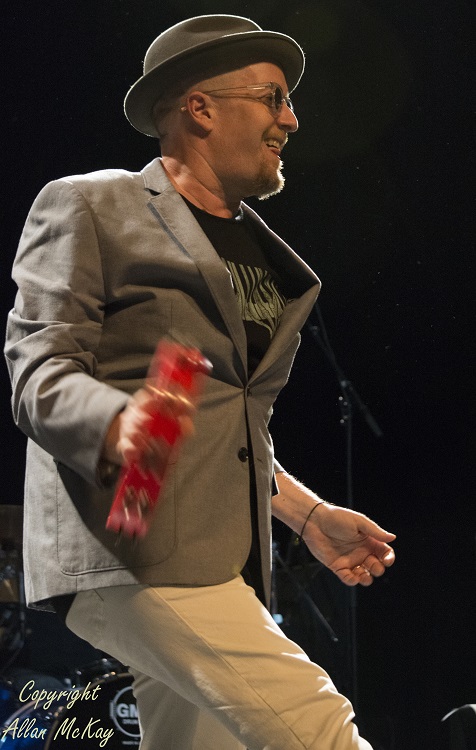
Skip forward just a year to October 21 2011. The Reverend Harold Camping had predicted (for the second time) that the world would end on that day. On stage at the Empire, it was beginning to look like he might be right. From the start of the set, there were complaints from the band about the monitor mix and just as the crew got that sorted out, another gremlin raised its head in the shape of Glenn Alexander’s guitar amp; it wasn’t amplifying. You’re on stage, the set’s just catching fire and suddenly your equipment blindsides you. Take losing your wi-fi for an hour and multiply it by a hundred; you’re getting close to the level of frustration on stage left that night. Long story short, it took three amps before the glitch was solved; the only problem now was to get the gig back on track, so what would the mainman do. The mainman called a Sonny Boy Williamson tune, “Help Me”, throwing the spotlight back at Glenn to harness his frustration and kickstart the show; which it did, with a vengeance. That’s a great band and bandleader in action right there.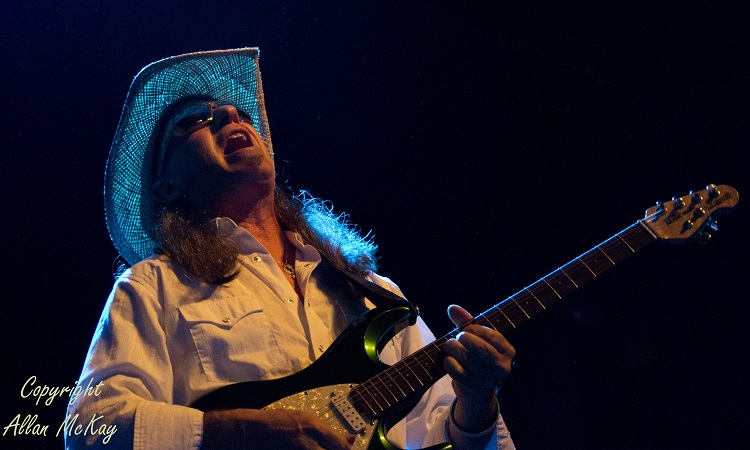
And, honestly, it’s not for everyone. If your thing is a setlist that’s been rehearsed to within an inch of its life, absolutely note-perfect and with a synched lighting plot (and I’m honestly not knocking that) this isn’t the gig for you. However, if you want a set that’s unpredictable, packed with powerful vocal and instrumental performances and great tunes, this definitely is for you. And I haven’t even mentioned my favourite combination yet. Cheese and onion, sweet and sour, trouble and strife don’t even come close – it’s horns and Hammond, Hammond and horns (see, it’s even alliterative). The recipe’s pretty simple; get seven of the best live musicians you can find, make sure they know all of (ok, most of) the songs and give them plenty of opportunities to express themselves. When those guys are Jeff Kazee (keys), Glenn Alexander (guitar), John Conte (bass), Tom Seguso (drums), John Isley (sax), Chris Anderson (trumpet) and Neal Pawley (trombone) each performance will be special and different. Now, that I will go see and hear any time.
So why am I telling you all of this now? Easy, there’s a couple of those increasingly rare opportunities to see Southside Johnny and the Asbury Jukes in the UK on a mini tour in March 2019. The band’s playing Glasgow (St Luke’s) on March 19th, London (Shepherd’s Bush Empire) on March 22nd and Holmfirth (Picturedrome) on March 23rd and 24th. Why two gigs at The Picturedrome? Because the first one sold out – obviously the North of England knows about good music. These UK gigs are precious because it ain’t cheap to bring an eight-piece across the Atlantic and you never know how long it is until the next tour.
So get yourself some tickets for one of the remaining shows and treat yourself to one of the best live bands in the business. What will they play? I don’t know and, most likely they don’t know, but it will be special and it won’t be anything like the set they played the previous night. See you at The Bush.
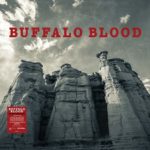 Humour me for a minute. Every so often, a piece of work like this comes along (it’s not just an album it’s a project, maybe even a concept) where every aspect and detail is absolutely perfect. The humouring bit concerns my particular slant on the project. MusicRiot’s gig team, The Riot Squad, are big fans of Dean Owens, the UK representative on the project, so forgive me if I spend a bit of time on Dean’s contribution. It’s fair to say that Dean’s solo material has a strong sense of location; he writes about the area and the people he knows, just like Ian Rankin and Irvine Welsh in their novels and short stories. It’s also fair to say that he’s always been willing to push the boundaries in his collaborations, spreading out into traditional Scottish folk ballads as Redwood Mountain with Amy Geddes, rockier material with his occasional band Deer Lake and his consistently excellent work with Will Kimbrough (more about that later).
Humour me for a minute. Every so often, a piece of work like this comes along (it’s not just an album it’s a project, maybe even a concept) where every aspect and detail is absolutely perfect. The humouring bit concerns my particular slant on the project. MusicRiot’s gig team, The Riot Squad, are big fans of Dean Owens, the UK representative on the project, so forgive me if I spend a bit of time on Dean’s contribution. It’s fair to say that Dean’s solo material has a strong sense of location; he writes about the area and the people he knows, just like Ian Rankin and Irvine Welsh in their novels and short stories. It’s also fair to say that he’s always been willing to push the boundaries in his collaborations, spreading out into traditional Scottish folk ballads as Redwood Mountain with Amy Geddes, rockier material with his occasional band Deer Lake and his consistently excellent work with Will Kimbrough (more about that later).
Buffalo Blood is something else indeed. Dean teamed up with his Nashville friends and collaborators Neilson Hubbard, Audrey Spillman and Joshua Britt, along with sound engineer and photographer Jim DeMain to spend two weeks deep in the New Mexico desert feeling the forces of previous lives played out there while writing and recording fifteen songs that tap into the echoes of centuries of betrayal, exploitation and alienation of the Native American peoples. And it’s not just the songs; there’s video and photography as well. The incredibly ambitious aim of the project is to immerse the listener in five hundred years of Native American experience. What’s truly incredible is that they actually succeeded. “Buffalo Blood” is an album that will entrance you, engage you and enrage you; maybe it will even make you take a serious look at the history of the indigenous peoples of the American continent. That’s what can happen when creative artists follow their instincts and beliefs and just create; I can’t imagine any of the major music providers bankrolling this project, but I believe “Buffalo Blood” has a real shot at commercial success; it’s that powerful.
The songs were recorded live outdoors in the desert, the wind and animal noises contributing to the feeling of immersion in an environment that retains echoes of centuries of struggle. The quality of the songwriting is consistently high across the album as Celtic, European and Native American influences combine to create a perfect musical backdrop for a message that is still relevant (Standing Rock ring any bells?).
The album has a narrative flow; it moves from the original contact with European settlers through time to the closing lament “Vanishing World”, which is perfectly suited to Dean Owens’ plaintive voice. This album is a classic, carrying a very potent message through the medium of haunting melodies and flawless performances; get it on your wishlist.
If you needed the album to be ground-breaking in any more ways, it’s the first UK release on the Eel Pie Records label and it’s available as a vinyl gatefold double album or digitally from Friday February 15 (EPRLP001)
Breaking news – Dean Owens won UK Song of the Year at the UK Americana Awards 2019 for the title track from his 2018 “Southern Wind” collaboration with Will Kimbrough. And that’s not the only good news from the Buffalo Blood camp; Neilson Hubbard produced “Southern Wind” and also Ben Glover’s “Shorebound” (UK Album of the Year winner) and “Rifles and Rosary Beads” for Mary Gauthier, who won International Artist of the Year and is up for a Grammy this year. Not a bad haul, and that’s before “Buffalo Blood” is released.
If you need any more recommendations for Buffalo Blood, try this:


